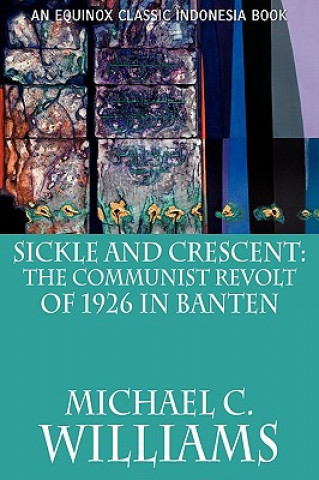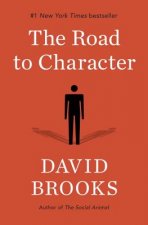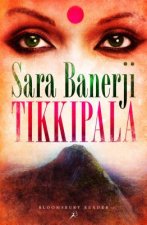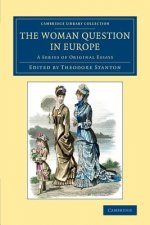
Kód: 09002858
Sickle and Crescent
Autor Michael C. Williams
"Alongside the crescent, the star of the Soviets will be the great battle emblem..." - Tan Malaka Twice in this century the people of Banten have risen in revolt against those they considered to be their ... celý popis
- Jazyk:
 Angličtina
Angličtina - Vazba: Brožovaná
- Počet stran: 116
Nakladatelství: Equinox Publishing (Asia) Pte Ltd, 2009
- Více informací o knize

Mohlo by se vám také líbit
-

The Road to Character
658 Kč -

Acquisitions of the Spirit
797 Kč -

Tikkipala
562 Kč -

Woman Question in Europe
1804 Kč
Darujte tuto knihu ještě dnes
- Objednejte knihu a zvolte Zaslat jako dárek.
- Obratem obdržíte darovací poukaz na knihu, který můžete ihned předat obdarovanému.
- Knihu zašleme na adresu obdarovaného, o nic se nestaráte.
Více informací o knize Sickle and Crescent
Nákupem získáte 102 bodů
 Anotace knihy
Anotace knihy
"Alongside the crescent, the star of the Soviets will be the great battle emblem..." - Tan Malaka Twice in this century the people of Banten have risen in revolt against those they considered to be their oppressors. On both occasions the leadership of the revolts was largely religious and yet at the same time announced to all that it was Communist. The revolutionary leadership successfully portrayed their ideology as both past and future. In 1926 and again in 1945, revolt was to be the harbinger of freedom from colonial rule and the dawn of a new era of social justice and prosperity. These are familiar themes of Communist-inspired revolt, but the Bantenese revolutionaries also delved deep into their past history to proclaim that the advent of Communist revolt would also lead to the restoration of the Sultanate of Banten. The Banten region illustrates strikingly that the movement from "archaic" to modern forms of political protest is not lineal but dialectical. As Geertz has perceptively remarked, "there is in such matters no simple progression from 'traditional' to 'modern,' but a twisting, spasmodic, unmethodical movement which turns as often toward repossessing the emotions of the past as disowning them." This dialectical connection between future, present, and past was evident not only in the ideology of the two main revolts, but also in the social composition of the revolutionary leadership. In both uprisings descendants of the former Sultans of Banten, called tubagus, and others holding noble titles they had borne from old, played a prominent role. Indeed one of the very first actions of the Indonesian Communist Party (PKI) branch in 1925 was to demand compensation and pensions for all who bore the title tubagus from a sultanate abolished nearly a century before. They rubbed shoulders in the revolutionary leadership with other traditional leaders of peasant revolt, such as the Islamic teachers, the ulama, and the local men of violence, the jawara, but also with more "modern" revolutionaries such as artisans, printers, journalists, and trade unionists. In short, the uncompromising insistence on modernity that was to be a hallmark of the PKI after 1951 was certainly not a prominent feature of the movement in the 1920s or in 1945.
 Parametry knihy
Parametry knihy
Zařazení knihy Knihy v angličtině Humanities History Regional & national history
1024 Kč
- Plný název: Sickle and Crescent
- Podnázev: The Communist Revolt of 1926 in Banten
- Autor: Michael C. Williams
- Jazyk:
 Angličtina
Angličtina - Vazba: Brožovaná
- Počet stran: 116
- EAN: 9786028397537
- ISBN: 9786028397537
- ID: 09002858
- Nakladatelství: Equinox Publishing (Asia) Pte Ltd
- Hmotnost: 182 g
- Rozměry: 229 × 152 × 7 mm
- Datum vydání: 16. December 2009
Oblíbené z jiného soudku
-

Hundred Years' War on Palestine
330 Kč -

Ethnic Cleansing of Palestine
358 Kč -

History of Japan
406 Kč -

Ten Myths About Israel
336 Kč -

Strange Death of Europe
410 Kč -

Decline and Fall of the Roman Empire
130 Kč -

Secret History
320 Kč -

God's Playground A History of Poland
1700 Kč -

Mayflower
388 Kč -

How to be a Victorian
357 Kč -

Plantagenets
334 Kč -

General's Son
427 Kč -

Iran: A Very Short Introduction
269 Kč -

Temples of Karnak
3800 Kč -

Cuneiform
276 Kč -

Twenty Years A-Growing
249 Kč -

History of Witchcraft in England from 1558 to 1718
453 Kč -

Bohemian Paris
415 Kč -

China in Africa
894 Kč -

Islandman
249 Kč -

Lancaster And York
490 Kč -

Alexiad
427 Kč -

Modern France: A Very Short Introduction
269 Kč -

Inside Hitler's Greece
522 Kč -

Diana: Her True Story - In Her Own Words
306 Kč -

The Fourth Turning
441 Kč -

The Oxford History of Ancient Egypt
383 Kč -

Churchill: The Power of Words
410 Kč -

Palestine
534 Kč -

Korean History in Maps
709 Kč -

Great Gatsby (Wisehouse Classics Edition)
409 Kč -

Viking Way
1144 Kč -

The Thirteenth Tribe
309 Kč -

My Promised Land
358 Kč -

Vanished Kingdoms
514 Kč -

Age Of Revolution
410 Kč -

Life and Death of Anne Boleyn
624 Kč -

Coming of the Third Reich
407 Kč -

Children of Ash and Elm
464 Kč -

Europe Between the Oceans
798 Kč -

Socialism Betrayed
477 Kč -

303 Squadron
464 Kč -

Ancient Celts, Second Edition
628 Kč -

Dancing in the Glory of Monsters
396 Kč -

Battle of Britain: Luftwaffe Blitz (Images of War)
606 Kč -

Age of Confucian Rule
851 Kč -

Beyond Band of Brothers
410 Kč -

Benjamin Franklin
410 Kč -

On China
462 Kč
Osobní odběr Praha, Brno a 12903 dalších
Copyright ©2008-24 nejlevnejsi-knihy.cz Všechna práva vyhrazenaSoukromíCookies



 Vrácení do měsíce
Vrácení do měsíce 571 999 099 (8-15.30h)
571 999 099 (8-15.30h)